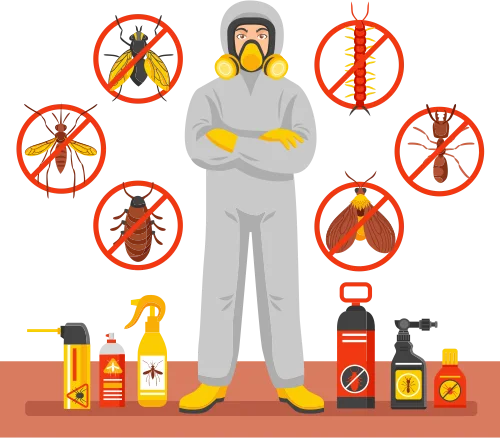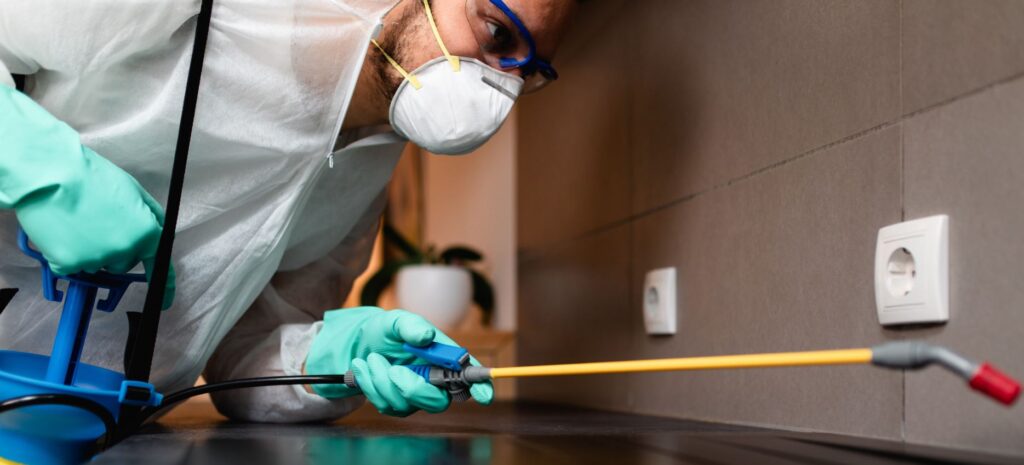Experienced Coquitlam Exterminator for Comprehensive Pest Removal
Experienced Coquitlam Exterminator for Comprehensive Pest Removal
Blog Article
Safe and Trusted Parasite Control for Lasting Protection
Efficient bug administration requires a multifaceted approach that balances eco-friendly honesty with the requirement for effective parasite reductions. The nuances of these methods may not be right away clear, prompting a better assessment of the methods that can lead to sustainable pest control outcomes.
Understanding Pest Control Methods
Parasite control includes a selection of approaches targeted at handling and eradicating unwanted insects and rats that can threaten both health and home. Comprehending these approaches is critical for reliable insect management.
The main categories of parasite control techniques include mechanical, biological, and chemical approaches. Mechanical techniques involve physical barriers and catches to stop bug entrance and capture undesirable species. As an example, using displays on home windows or employing sticky catches can substantially reduce insect populations without presenting unsafe substances.

Chemical bug control is commonly the most recognized technique, using chemicals to get rid of parasites. These chemicals can be efficient however need to be made use of with care to stay clear of unfavorable effects on non-target species and the setting.
Benefits of Eco-Friendly Solutions
Just how can eco-friendly solutions change insect control methods? The fostering of environment-friendly insect control methods provides various benefits, considerably improving the efficiency and safety of insect administration.

An additional benefit is the favorable effect on local biodiversity. Environmentally friendly options are created to target certain bugs while protecting helpful bugs and wild animals, promoting a well balanced environment. This technique straightens with the expanding customer need for sustainable methods, improving the track record of pest control carriers.
Integrated Parasite Management Techniques
The execution of eco-friendly services normally brings about the fostering of Integrated Parasite Monitoring (IPM) techniques, which even more boost pest control efficacy. IPM is a holistic technique that integrates multiple methods to handle pest populaces while lessening environmental influence. This approach highlights using organic, cultural, mechanical, and chemical controls, guaranteeing a lasting and well balanced approach of parasite management.
One essential element of IPM is the detailed assessment of insect task and ecological problems. By monitoring bug populations and recognizing their life cycles, practitioners can apply targeted treatments that disrupt the insect's environment or lifecycle, lowering dependence on chemical pesticides. Furthermore, social methods such as plant rotation and habitat control can significantly lessen pest establishment and reproduction.
One more vital component is the use of biological control representatives, such as beneficial insects or microbes, which can normally reduce insect populations. When chemical applications are necessary, IPM focuses on making use of low-risk chemicals and applies them selectively, decreasing exposure to non-target organisms and people.
Including IPM techniques not only improves pest control performance however likewise advertises a safer community, straightening with the expanding need for lasting practices in pest management.
Safe Practices for House Owners
Comprehending the relevance of secure practices in insect control can equip house owners to efficiently take care of insect concerns while safeguarding their health and the atmosphere. Carrying out preventative measures and non-toxic approaches is important in lessening direct exposure to dangerous chemicals.
House owners ought to first evaluate their environment for conditions that draw in pests, such as standing water, food, and clutter waste. Frequently cleansing and sealing entry factors can deter bugs from invading the home. Making use of natural deterrents, such as crucial oils or diatomaceous earth, can give efficient choices to chemical pesticides.
When chemical treatments are necessary, home owners ought to select items that are particularly labeled as secure for domestic usage. It is necessary to comply with application guidelines carefully to prevent overexposure. Moreover, making use of targeted therapies in locations where pests are determined, instead of covering splashing, can dramatically decrease chemical use.
Finally, keeping open interaction with pest control experts is essential. Property owners must ask about the security of products utilized and demand environment-friendly choices whenever possible. By adopting these risk-free techniques, home owners can create a This Site healthier living atmosphere while successfully taking care of parasite concerns.

Tips for Long-Term Protection
Developing a pest management technique that highlights long-term protection can significantly improve the efficiency of the safe methods formerly reviewed. To attain this, homeowners ought to apply regular examinations of their home, focusing on hidden areas such as attic rooms, cellars, and crawl rooms. Early detection of insect activity is crucial in stopping infestations from taking hold.
These methods decrease attractants that attract bugs into the home. Securing entrance points, such as fractures around doors and home windows, can efficiently block possible next bug gain access to.
Landscape design ought to also be considered; maintaining plants cut and preserving a distance in between plants and the home minimizes concealing places for bugs. Making use of natural deterrents, such as important oils or diatomaceous earth, can better prevent infestations without considering extreme chemicals.
Lastly, teaming up with an expert parasite control solution for periodic examinations can offer an extra layer of protection. These professionals can supply tailored suggestions and advanced treatments, ensuring that your home remains safeguarded versus insects in the long-term.
Final Thought
Finally, reputable and safe pest control requires a multifaceted strategy that highlights green methods and incorporated insect management. By carrying out natural deterrents, performing normal examinations, and keeping proper sanitation, building proprietors can considerably lower parasite populations while safeguarding advantageous pests and the setting. Cooperation with specialist pest control solutions enhances the effectiveness of these approaches, making sure customized options that supply lasting security and comfort versus future problems.
Reliable bug monitoring calls for a diverse strategy that balances eco-friendly stability with the requirement for reliable bug suppression. The fostering of environmentally friendly bug control techniques uses countless check my site advantages, substantially improving the effectiveness and security of insect administration.The implementation of eco-friendly solutions naturally leads to the fostering of Integrated Insect Management (IPM) techniques, which further boost parasite control effectiveness. exterminator coquitlam. By checking bug populaces and determining their life cycles, professionals can execute targeted interventions that interfere with the bug's habitat or lifecycle, decreasing dependence on chemical pesticides.In conclusion, secure and trusted pest control calls for a multifaceted technique that highlights environmentally friendly methods and incorporated parasite monitoring
Report this page